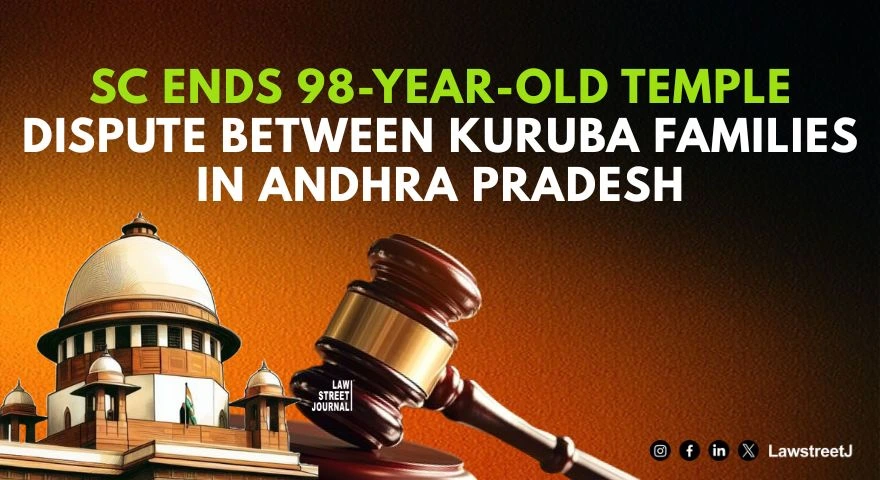New Delhi: The Supreme Court has finally resolved a nearly century-old temple dispute between two Kuruba families from Andhra Pradesh concerning the management and worship rights of Lord Sangalappa Swamy.
A Bench comprising Justice Prashant Kumar Mishra and Justice Vipul M. Pancholi delivered its judgment on November 11, 2025, upholding the Andhra Pradesh High Court’s decision that had set aside the executing court’s decree passed in favour of the Kapadam family.
The litigation, spanning over nine decades, involved members of the Kamatam family of Yerrayapalli village and the Kapadam family of Gungulakunta village, both claiming traditional and hereditary rights over the temple rituals and the custody of the idols.
The Court noted that the dispute originated in 1927, leading to a compromise decree in 1933, under which both families were to share the temple’s administration and rituals. As per the terms of the decree, the two families were to perform worship alternately every three months, exchange custody of the idols every six months, and share expenses equally, with the Kamatam family paying ₹2,000 towards their half share.
However, alleging breach of the terms, the Kapadam family filed an execution petition in 2000 seeking enforcement of the compromise decree. The executing court in 2005 allowed the plea and ordered the return of the idols to the Kapadam side under Order XXI Rule 31 of the Code of Civil Procedure. This order was later reversed by the High Court in 2012, which found no substantive evidence of any violation of the compromise decree.
Dismissing the appeal before it, the Supreme Court upheld the High Court’s findings and observed that the executing court had erred in proceeding on presumptions rather than proven facts. The Bench held that the appellants failed to produce reliable evidence showing any breach or disobedience of the compromise decree by the respondents.
The Court observed:
“Findings based on assumptions cannot replace evidence. There is nothing on record to indicate that the terms of the compromise decree were violated or that the conditions therein were disobeyed.”
It further noted that there was no record of appointment of trustees or maintenance of accounts as mandated under the decree, nor was there proof of the ₹2,000 payment or rotation of idols between the two families.
Concluding that the High Court’s order suffered from no legal infirmity, the Supreme Court dismissed the appeal, thereby bringing closure to one of India’s longest-standing private temple disputes.
Case Title: Kapadam Sangalappa & Ors. v. Kamatam Sangalappa & Ors.
Court: Supreme Court of India
Bench: Hon’ble Justice Prashant Kumar Mishra and Hon’ble Justice Vipul M. Pancholi
Date of Judgment: November 11, 2025











